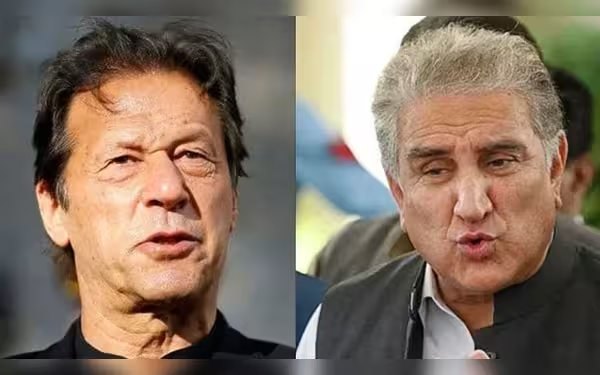Saturday, November 16, 2024 07:38 PM
Imran Khan, Qureshi Indicted in GHQ Attack Case
- 498 individuals indicted in GHQ attack case.
- Imran Khan and Shah Mehmood Qureshi among the accused.
- Court proceedings adjourned, raising justice concerns.
 Image Credits: thenews
Image Credits: thenewsImran Khan and Shah Mehmood Qureshi indicted among 498 in GHQ attack case, raising concerns over justice and political stability in Pakistan.
On May 9, a series of violent protests erupted across Pakistan, leading to significant unrest and chaos. The protests were sparked by various political tensions, and one of the most notable incidents was the attack on the General Headquarters (GHQ) in Rawalpindi. In the aftermath of these events, the Special Anti-Terrorism Court No. 1 in Rawalpindi has taken a decisive step by indicting 498 individuals, including prominent political figures such as "Imran Khan" and former foreign minister "Shah Mehmood Qureshi." This development marks a critical moment in the ongoing legal proceedings related to the protests.
Judge "Amjad Ali Shah" presided over the court session where the charges were formally presented. However, the court adjourned the proceedings without any further action on Saturday, leaving many questions unanswered. The hearing of 12 separate cases, which involve the encirclement of government properties and attacks on police officers, was also postponed until October 9. This delay has raised concerns about the pace of justice in these high-profile cases.
Following the May 9 protests, the Rawalpindi police registered multiple cases against various individuals. These cases were filed at different police stations, including "RA Bazar," "City," "Cantt," "Race Course," "New Town," "Sadiqabad," "Civil Line," "Waris Khan," "Morgah," "Sadar Wah," and "Taxila." Each case highlights the severity of the incidents that occurred during the protests, with many prominent figures named, such as "Shireen Mazari," "Zartaj Gul," "Sadaqat Abbasi," "Arif Abbasi," "Colonel (retd) Shabbir Awan," "Major (retd) Latasab Satti," and "Chaudhry Javed Kausar." These names reflect the political landscape of Pakistan and the implications of the protests on its leadership.
Imran Khan, the former Prime Minister, was officially arrested in connection with these cases on January 8. His involvement has drawn significant media attention and public scrutiny. It is also noteworthy that the court has previously ordered the exclusion of Khan's wife, "Bushra Bibi," from these cases, which adds another layer of complexity to the legal proceedings.
The indictment of such a large number of individuals, including high-profile politicians, underscores the gravity of the situation in Pakistan. It raises important questions about accountability, the rule of law, and the future of political discourse in the country. As the legal process unfolds, many will be watching closely to see how these cases are handled and what implications they may have for Pakistan's political landscape.
The indictment of Imran Khan and others in the GHQ attack case is a significant development in Pakistan's ongoing political saga. It serves as a reminder of the challenges facing the nation in terms of governance, justice, and political stability. As the court proceedings continue, it is essential for the public to remain informed and engaged, as the outcomes will undoubtedly shape the future of Pakistan.













